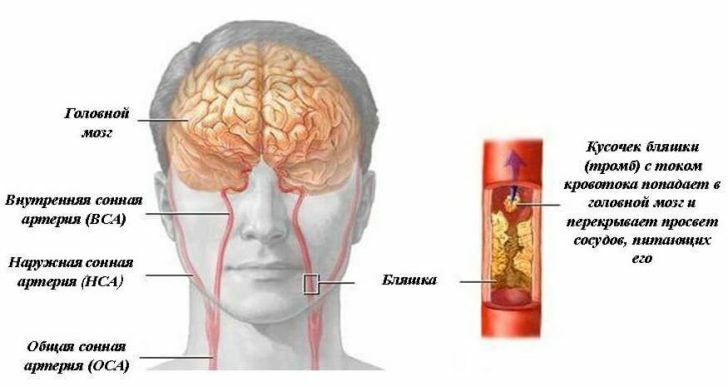Tablets for lowering pressure: a review of antihypertensive drugs
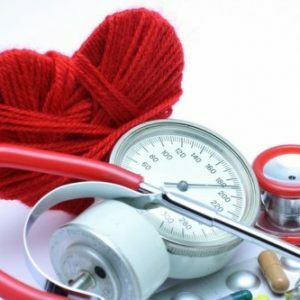
Increased blood pressure doctors perceive as a real disaster.But patients are often surprised to see that it is possible to reduce the pressure by available and known medicines, many people do not notice such "jumps" at all and lead a normal lifestyle.In fact, increasing blood pressure - a powerful blow to the vessels of the brain, the heart, kidneys and even the eyes.Untreated hypertension is the risk of developing myocardial infarction and other heart diseases, brain damage, irreversible changes in the retina of the eyes and kidney failure.
Table of contents:Key principles of the treatment of hypertension
The main goal of the treatment of hypertension is not to stop attacks of increasing blood pressure, but to prevent them, prevent kidney damage, heart, brain and eyes, stabilize blood pressure indicators for a long period of .The doctor will never prescribe antihypertensive drugs at the first detection of high blood pressure, because first you need to assess the possible risks.
First, doctors take into account the numbers of blood pressure.Abnormal blood pressure is higher than 140/90 .It is noteworthy that earlier there was a separation of indicators considered to be the norm for a certain age, and modern medicine clearly delineates the norm and the disease.Thus, it was determined that only indicators exceeding 140/90 require therapy.But in this case it is not always appropriate to immediately make medicamentous appointments!If there is a steady increase in blood pressure, but there is no ischemic disease, diabetes mellitus, and other pathologies, it is possible to normalize the patient's condition by adjusting nutrition and weight, correcting a lifestyle, choosing physical exertion, and psychotherapy.
Note: The upper limit, which allows to carry out a non-pharmacologic correction of the blood pressure, is 160/90.Higher indicators are a direct way to receive specific drugs.
Secondly, the doctor will determine which indicators need to be achieved by the appointment of treatment.Modern medicine implies that for all age groups the target figures of the pressure indicators will be 140-135 / 90-85. Only patients over 60 years old with diagnosed diabetes mellitus or kidney disease are the exception - their blood pressure values should be kept within 120-130 / 85.
There is a category of people who underestimate the importance of treating hypertension, they believe that in the absence of constant jumps in blood pressure indicators, there is no need to take any specific drugs.And there is a category of people who draw information about the use of antihypertensive drugs from the Internet and printed publications.Both of them make a mistake that can cost them their lives. It is much more reasonable to apply for qualified medical care - a neuropathologist or a cardiologist will not only be convinced of the need to take medications that lower blood pressure, but also appoint the most suitable, select the dosage and determine the duration of the course of treatment.
Thiazide diuretics and sulfonamides
These drugs are part of the saluretics that help improve urine output. It is due to this that the swelling of the vascular wall is reduced, the lumen of the vessels is enlarged and, thus, optimal conditions for reducing the pressure are created.
Thiazides
These include Cyclomethiazide, hydrochlorothiazide, and Hypothiazide.They begin to act no sooner than a half to two hours after ingestion, the effect lasts a maximum of 12 hours.
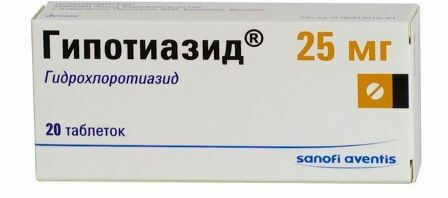
The average therapeutic dose for monotherapy is 25-50 mg, and if the doctor prescribes other drugs, then the thiazides should be taken at a dose of a maximum of 25 mg.The optimal time for taking such medications is morning, since frequent urination at night is somewhat inconvenient.
Taking thiazides can cause side effects:
- muscle pain;
- increased thirst and dry mouth;
- increased fatigue;
- confusion;
- muscle cramps;
- vagueness of vision;
- headaches;
- nausea and vomiting;
- arrhythmia;
- dizziness;
- allergic reactions in the form of urticaria.
In addition, the effect of long-term thiazides may include cholecystitis, chronic constipation, pancreatitis, decreased potency, impaired renal function, and non-cardiogenic pulmonary edema.
Categorically it is contraindicated to take medicines from the group of thiazides with:
- pregnancy and breast-feeding;
- of renal failure;
- Addison's disease;
- of hepatic insufficiency occurring in severe form;
- electrolyte disturbances;
- anuria;
- uncompensated diabetes mellitus.
Thiazides are not used in pediatric practice to reduce blood pressure in children under 3 years of age.
Sulfonamides
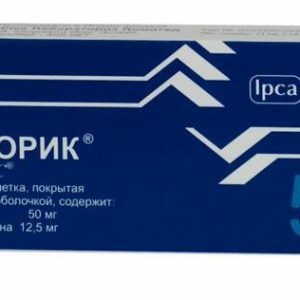 These include Chlortalidone, Indapamide and Tenorik( combined preparation).These drugs are prescribed for patients with diagnosed severe hypertension.Indapamide is considered the optimal choice in the treatment of hypertension in people with diabetes, since it does not affect the level of glucose in the blood. Preparations from the group of sulfonamides significantly reduce the risk of developing cardiac and vascular diseases, do not accumulate in the body and are excreted by the kidneys and liver.
These include Chlortalidone, Indapamide and Tenorik( combined preparation).These drugs are prescribed for patients with diagnosed severe hypertension.Indapamide is considered the optimal choice in the treatment of hypertension in people with diabetes, since it does not affect the level of glucose in the blood. Preparations from the group of sulfonamides significantly reduce the risk of developing cardiac and vascular diseases, do not accumulate in the body and are excreted by the kidneys and liver.
These drugs are prescribed at a dosage of 2.5 mg per session per day.The action lasts for 24 hours, the therapeutic effect can be noted only 7 days after the start of admission. Prolonged use of funds from the sulfonamide group can lead to side effects:
- derangement of the stool;
- sharp decrease in blood pressure;
- stomach pain;
- a temporary darkening in the eyes;
- nausea and vomiting;
- increased heart rate.
In addition, the patient may develop nervousness, pharyngitis, constant dry mouth, insomnia, depression and dizziness.
Categorically it is contraindicated to prescribe the drugs of the group under consideration during pregnancy and lactation, with the observed decrease in the level of potassium in the blood, liver and renal failure, which occur in severe form .
Beta-blockers
These drugs can be used for monotherapy or combined treatment.They are excellent for correcting blood pressure in patients with a history of myocardial infarction, previously diagnosed with angina, in chronic heart failure.
Carvedilol
This drug is used once a day for 25-50 mg per reception.In some cases, side effects such as allergic reactions, stool / vomiting / nausea, dizziness / headache, pain in the extremities, dyspnea / dry cough, and a sharp drop in blood pressure to critical levels may occur in the presence of long-term carvedilol.
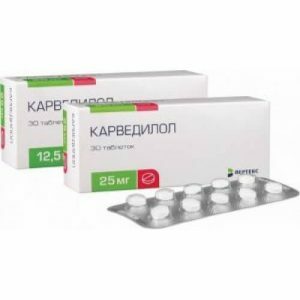 Carvedilol is contraindicated in:
Carvedilol is contraindicated in:
- heart failure decompensated type;
- bronchial asthma;
- liver pathologies;
- reduction of heart rate;
- breastfeeding.
Pregnancy, psoriasis, depression, thyrotoxicosis, diabetes mellitus and kidney failure are considered to be conditions in which the antihypertensive drug under consideration is conditionally contraindicated, that is, it should be used with caution.
Bisoprolol
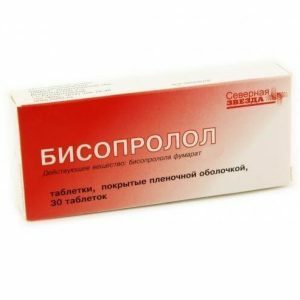 It is taken in a dose of a maximum of 10 mg once a day, it is better to drink a pill in the morning hours.If the hypertension is mild and a critical increase in blood pressure has never been recorded, then the daily dosage may be 2.5 mg.
It is taken in a dose of a maximum of 10 mg once a day, it is better to drink a pill in the morning hours.If the hypertension is mild and a critical increase in blood pressure has never been recorded, then the daily dosage may be 2.5 mg.
Note: in no case can not abruptly cancel bisoprolol, as there may be a sharp increase in blood pressure - the cancellation period is 2 weeks.
Contraindications and side effects are similar to carvedilol.
Angiotensin-converting enzyme( ACE) inhibitors
Drugs from this group of drugs are able to block an enzyme that turns renin into angiotensin - it narrows the blood vessels.In addition, angiotensin-converting( ACE) enzyme inhibitors reduce blood flow to the heart, thereby preventing thickening of the heart muscle and helping it to recover in the event of an onset of hypertrophy.
ACE inhibitors with sulfhydryl group
These include Lotenzin, Kapoten, Zokardis, which are priority in the management of hypertensive crises.They are not recommended for elderly people with diagnosed atherosclerosis, as they can provoke hypotension and loss of consciousness.Take these drugs 2 times a day, starting with a minimum dose of 12.5 mg( further increase in the dose - at the discretion of the treating doctor), an hour before meals.
The drugs under consideration, with prolonged use, can cause the appearance of side effects - for example, renal dysfunction, dizziness, increased drowsiness, tachycardia, bronchospasm, anemia and others.
Categorical contraindications for the administration of ACE inhibitors with sulfhydryl group include:
- pregnancy and lactation period;
- children under the age of 18;
- difficulty in outflow of blood from the left ventricle of the heart;
- period after kidney transplantation.
Extremely cautious and only under the supervision of a physician these drugs are prescribed for patients with diabetes mellitus, cerebral ischemia and severe autoimmune diseases.
ACE inhibitors with carboxyl group
These include Enalapril, Diroton, Prestarium, Quadropril, Quinopril, Perineva, Lizoril and others.They have a positive effect on the life expectancy of patients with hypertension, and the most unpleasant side effect is an obsessive dry cough.Take the listed medications once a day, starting with 5 mg, only after 14 days the doctor can increase the daily dose to 10 mg.
Contraindications to the appointment and administration of ACE inhibitors with a carboxyl group are:
- pregnancy and lactation period;
- ischemic heart disease;
- hepatic and renal insufficiency;
- diabetes mellitus;
- severe immune diseases.
In addition to dry cough, side effects included nervousness, fatigue, headaches, dizziness, pulmonary embolism, depression, hair loss and decreased sexual desire.
Sartans
This is a new generation of drugs that can effectively reduce blood pressure throughout the day.They are taken once( in the morning or at night), have few side effects and, in comparison with the previous described medications, very rarely sharply reduce the pressure, cause a dry cough.Steady effect is observed after 4-6 weeks of regular intake of medicines from the Sartans group, which include Losartan, Valsakor, Diovan, Atakand, Twentieth, Prezartan and others.
Losartan
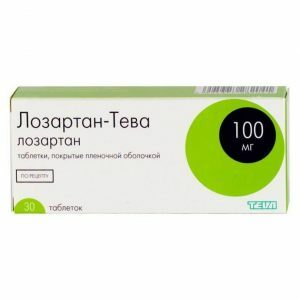 This is one of the priority drugs prescribed for the treatment of hypertension.It is taken once a day at a dose of 50 mg, then, at the discretion of the treating doctor, the dosage can be increased to 100 mg per day.
This is one of the priority drugs prescribed for the treatment of hypertension.It is taken once a day at a dose of 50 mg, then, at the discretion of the treating doctor, the dosage can be increased to 100 mg per day.
This drug is contraindicated in the treatment of hypertension during pregnancy and lactation, with diagnosed dihydration and hyperkalemia, in children of childhood.
Calcium channel blockers
This group of antihypertensive drugs includes Amlodipine, Calzigard, Corinfar, Diacordin, Amlovas, Cardil and others.They increase the tolerance of exercise, are used in mandatory combination with ACE inhibitors, but they are never combined with diuretics. Calcium channel blockers are preferably used to treat hypertension in elderly people with heart rhythm disturbances and angina pectoris.
Amlodipine
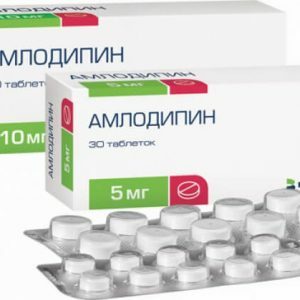 The most popular drug in this group of antihypertensive drugs is prescribed in a daily dose of 5 mg, which can be increased if necessary to 10 mg per reception.
The most popular drug in this group of antihypertensive drugs is prescribed in a daily dose of 5 mg, which can be increased if necessary to 10 mg per reception.
Side effects include nosebleeds, pain in the eyes, painful urination and the constant appearance of cold sweat.But they are extremely rare, this drug is well tolerated by patients and has a long lasting therapeutic effect.
Note: many people use central antihypertensives to lower blood pressure - for example, Clopheline, Tenzotran, Moxonidine and Andipal.Clopheline is generally removed from the treatment standards, Andipal is appropriate only for single increases in blood pressure against a background of vegetative-vascular dystonia, and all other drugs are effective only in the case of mild and uncomplicated hypertension.
Reserpine and Raunatin
These are the very first drugs that treated hypertension. Modern medicine believes that it is not advisable to apply them and there are quite logical explanations for this:
- The hypotensive effect of reserpine and raunatin appears very slowly - usually the effect occurs only 7-14 days after the beginning of the admission.But even in this case, clinically significant steady decrease in blood pressure occurs only in ¼ patients.
- The main side effect of taking these medications is breast cancer - according to statistics, the development of this disease is more often three times precisely because of the reception of Raunatin and Reserpine.
- There is evidence that taking these medications can provoke the development of prostate cancer.For example, in France, it is for this reason that a ban on the use of medicines, in which there is reserpine.
- Reserpine and Raunatin are dangerous for the elderly - reducing blood pressure, they can trigger the development of parkinsonism and depression.
Drugs for the treatment of hypertensive crises
If you need to undergo treatment for an uncomplicated hypertonic crisis, then you need to reduce the pressure gradually, for 1-2 days. In this regard, doctors will prescribe to the patient preparations in the form of tablets:
- Nifedipine;
- Captopril;
- Nitroglycerin - it is when it is taken, the hypotensive effect comes as quickly as possible, after 5-10 minutes comes relief.
If a complicated hypertonic crisis is treated, the patient is placed in a hospital( this is a prerequisite!) And he is prescribed intravenous injections of Esmolol, Enalaprilat, Propranolol, Labetalol.The hypotensive effect comes in a few minutes after the beginning of their introduction.
Treatment of high blood pressure is not taking one pill, but long-term therapy, which should be done only under the supervision of a doctor.This article reviews antihypertensive drugs, but they should be taken only for the purpose of a specialist who, when choosing the optimal option, will take into account the age of the patient, the concomitant diseases, and the available blood pressure values.
Tsygankova Yana Alexandrovna, medical reviewer, therapist of the highest qualification category


